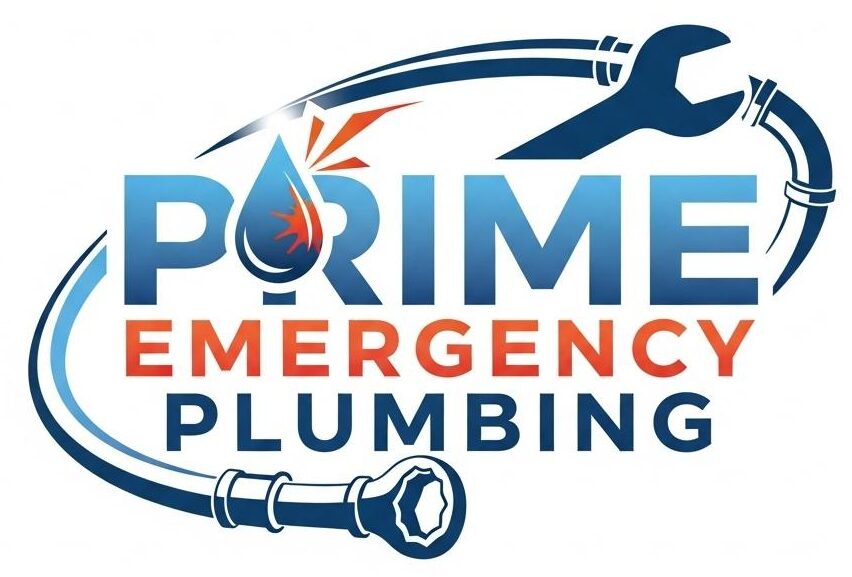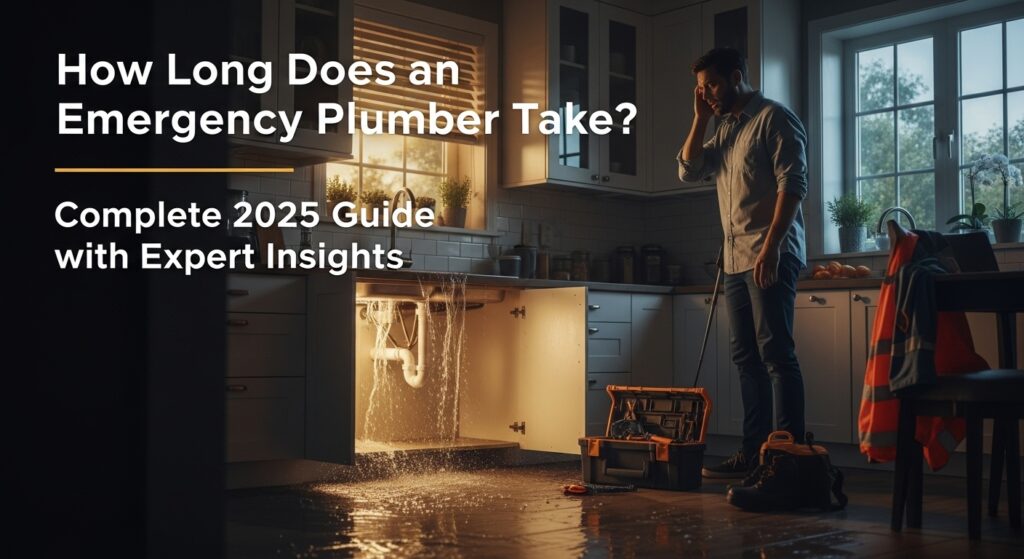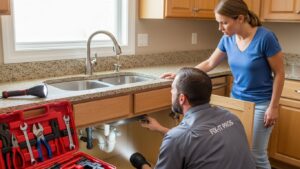How Long Does an Emergency Plumber Take? Complete 2025 Guide with Expert Insights
How Long Does an Emergency Plumber Take? (Complete 2025 Guide with Expert Insights)
When a pipe bursts in the middle of the night or a drain overflows unexpectedly, your first thought is usually: “How long does an emergency plumber take to get here?” The truth is, the response time depends on several factors—ranging from where you live to the type of problem you’re facing. In this comprehensive guide, we’ll break down everything you need to know about emergency plumbing timelines, repair durations, and what you can do to speed up the process.
Understanding Emergency Plumbing Services
Emergency plumbing services are designed for urgent issues that can’t wait until regular working hours. Unlike standard plumbing jobs, emergency plumbers operate 24/7, ensuring that homeowners can get help when they need it most—whether it’s a midnight pipe burst or an early morning water heater failure.
Common Types of Plumbing Emergencies
Some of the most frequent situations that require immediate attention include:
- Burst or leaking pipes
- Overflowing toilets
- Blocked drains or sewers
- No hot water or water heater failure
- Gas leaks
- Flooding from unknown sources
Each of these issues can cause serious property damage if ignored, making rapid response critical.
Why Response Time Matters
Water damage can escalate quickly. Within minutes, carpets and floors can absorb moisture; within hours, mold may begin to form. The longer you wait, the costlier and more complex the repair becomes. That’s why most professional plumbers aim to respond as fast as possible—often within an hour for urgent calls.
Average Response Time of an Emergency Plumber
So, how long does an emergency plumber take to arrive? On average, emergency plumbers take between 30 minutes to 2 hours to reach your location. The actual time can vary depending on several conditions.
What Affects Plumber Response Time
- Location: Urban areas tend to have faster service availability due to higher plumber density.
- Time of Day: Late-night or early-morning calls may face slight delays.
- Weather Conditions: Heavy rain or snow can slow travel times.
- Traffic and Distance: The closer the plumber, the faster the response.
- Service Demand: During storms or cold snaps, call volumes spike, causing longer waits.
24/7 Plumbing Services vs. Standard Hours
While standard plumbers may only operate during business hours, 24-hour emergency plumbers are available around the clock. However, their arrival time may depend on workload or technician availability during off-peak hours.
How Long Does It Take to Fix Common Emergencies?
Once your plumber arrives, the repair time depends on the severity of the issue.
Burst Pipe Repairs
A burst pipe can usually be repaired within 1 to 3 hours, depending on the pipe’s location and material. If the pipe is buried behind walls or flooring, additional time might be needed for access and restoration.
Blocked Drains
Clearing a blocked drain can take 30 minutes to 2 hours. Using drain snakes or hydro-jetting tools, professionals can quickly identify and remove the blockage, followed by a test to confirm full flow restoration.
Water Heater Repairs
Minor water heater issues—like faulty thermostats—may be resolved in 1 to 2 hours. However, full replacements can take 3 to 5 hours, especially if new equipment installation is required.
The Process: From Call to Completion
Understanding how plumbers work can help you estimate the total time your issue might take to resolve.
Step 1: Diagnosing the Problem
Upon arrival, the plumber inspects the issue and identifies its root cause. This stage usually takes 15 to 30 minutes.
Step 2: Repair Execution
Once diagnosed, the plumber will start the repair. The duration depends on the complexity—ranging from 30 minutes for small leaks to several hours for major damage.
Step 3: Testing and Cleanup
After the repair, the system is tested for leaks or pressure issues. The plumber also cleans up the workspace to ensure safety. This final step usually takes 15–45 minutes.
How to Speed Up the Plumber’s Arrival
When faced with an emergency, every minute counts. While you can’t control traffic or distance, you can take practical steps to minimize waiting time.
Choosing Local Services
The fastest way to get help is by calling a local emergency plumber. Local professionals know the area, understand traffic conditions, and can often arrive within 30–45 minutes. Additionally, local plumbers are more likely to prioritize nearby calls, especially for recurring customers.
Providing Accurate Information
When you call, be as specific as possible about the issue. Describe:
- What the problem is (e.g., burst pipe, leaking tap, flooding).
- Where it’s located in your home.
- How severe it seems (is water still running or has it been turned off?).
This information allows the plumber to bring the right tools and parts, saving time once they arrive.
Turn Off Water Supply
Before the plumber arrives, shut off your main water valve if you can safely access it. This can prevent additional flooding and make the repair process faster.
How to Speed Up the Plumber’s Arrival
When faced with an emergency, every minute counts. While you can’t control traffic or distance, you can take practical steps to minimize waiting time.
Choosing Local Services
The fastest way to get help is by calling a local emergency plumber. Local professionals know the area, understand traffic conditions, and can often arrive within 30–45 minutes. Additionally, local plumbers are more likely to prioritize nearby calls, especially for recurring customers.
Providing Accurate Information
When you call, be as specific as possible about the issue. Describe:
- What the problem is (e.g., burst pipe, leaking tap, flooding).
- Where it’s located in your home.
- How severe it seems (is water still running or has it been turned off?).
This information allows the plumber to bring the right tools and parts, saving time once they arrive.
Turn Off Water Supply
Before the plumber arrives, shut off your main water valve if you can safely access it. This can prevent additional flooding and make the repair process faster.
Costs Related to Emergency Plumbing
Emergency plumbing services are often more expensive than regular ones. The urgency, timing, and complexity of the issue all affect pricing.
Call-Out Fees and Hourly Rates
Most emergency plumbers charge a call-out fee ranging from $75 to $150, depending on the time of day and location. Hourly rates for emergency work usually range between $100 and $250.
Repairs done during weekends, holidays, or late nights often carry a premium rate, but these charges ensure rapid, round-the-clock availability.
How Time Impacts Cost
Longer repairs mean higher labor costs. Complex problems—like pipe replacements or water heater installations—require more time, raising your final bill. However, addressing an emergency immediately prevents costly damage later, making it a worthwhile investment.
Real-Life Case Studies
Here are a few examples to give you a better idea of real-world response and repair times.
| Scenario | Location | Response Time | Repair Duration | Outcome |
|---|---|---|---|---|
| Burst pipe in kitchen | Urban area | 35 minutes | 2 hours | Water shut off, pipe replaced |
| Blocked sewer line | Suburban home | 50 minutes | 1.5 hours | Line cleared with hydro-jetting |
| No hot water | Apartment complex | 1 hour 20 minutes | 3 hours | Thermostat replaced |
| Leaking toilet | Rural area | 2 hours | 45 minutes | Seal replaced, no further leaks |
These examples show that while location and problem type affect timing, most emergency plumbing issues can be resolved within 2–4 hours total (including arrival and repair).
Preventing Future Emergencies
Prevention is always better than repair. Regular plumbing maintenance can significantly reduce the risk of unexpected issues. For more detailed guidance on plumbing‑system standards and safety practices, see the Uniform Plumbing Code published by the International Association of Plumbing and Mechanical Officials.
Schedule Routine Inspections
Having a licensed plumber inspect your plumbing system once or twice a year can help identify early signs of corrosion, clogs, or pressure issues.
Monitor Water Pressure
Excessively high pressure can lead to pipe bursts. Use a simple gauge to ensure your home’s water pressure remains between 40–60 psi.
Avoid Flushing Non-Flushable Items
Items like wipes, paper towels, and grease can clog your pipes, leading to costly emergencies. Stick to flushing only toilet paper.
Insulate Pipes
In colder climates, insulating your pipes can prevent freezing, which is one of the most common causes of burst pipes in winter.
FAQs About Emergency Plumbing Response Time
How long does it take for an emergency plumber to arrive?
Most emergency plumbers arrive within 30 minutes to 2 hours, depending on your location and the time of day.
Can I get a plumber faster during the day than at night?
Usually, yes. During normal working hours, more plumbers are available, so response times tend to be quicker.
How can I prepare before the plumber arrives?
Shut off your main water supply, move furniture away from the affected area, and clear any standing water if possible.
Are emergency plumbing services available on weekends and holidays?
Yes. Many professional plumbing companies operate 24/7, including weekends and public holidays, though fees may be higher.
What’s the fastest way to find a reliable emergency plumber?
Use Google Maps or local business directories to find licensed plumbers near you with positive customer reviews. You can also check verified trade websites like Angi for reputable professionals.
Can an emergency plumber fix multiple issues in one visit?
Yes. If time and tools permit, most plumbers will handle multiple minor issues during the same appointment to save you additional costs later.
Conclusion
So, how long does an emergency plumber take?
Typically, between 30 minutes to 2 hours to arrive, and 1–3 hours to complete the repair, depending on the issue. The key factors influencing time include your location, the severity of the problem, and the plumber’s availability.
By choosing a local, 24/7 licensed plumber and providing accurate details upfront, you can significantly reduce waiting time and minimize damage. Regular maintenance is equally important—it ensures your plumbing system remains healthy and helps prevent costly emergencies.
If you’re currently dealing with an urgent issue, don’t wait. Contact a certified emergency plumber immediately to protect your property and restore comfort as quickly as possible.




